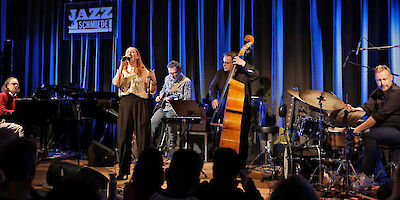The history of the Jazz-Schmiede
Ulrike Merten / Laurenz Haverkamp
"... Jazz is, strictly speaking, inside each one of us ... I am amazed that jazz has not always existed ... Nothing is intense enough - unless perhaps it is jazz ..."
- Jean Cocteau
"In the beginning there was the idea of proving that a jazz club in this city has a good chance of being needed by the public. As a live experience. It had to be a place whose name was bigger than the musicians performing there - similar to 'Ronnie Scott's' in London or the 'Village Vanguard' in New York. A club that you go to without knowing the programme. Because you know there's quality here. You can discover new things here!"
- Peter Weiss
Can that be a coincidence? A striking number of world-class drummers have been among the club's international guests over three decades: Steve Gadd, Roy Haynes, Al Foster, Brian Blade, Dennis Chambers, Jeff Hamilton, Alvin Queen, Dave Weckl, Denis Mackrel, Billy Hart ...!
The clinking of glasses sounds like the future. At table 4 in the distillery, Peter Weiss, Ralf Butscher (†), Heiner Siefert (†), Ali Claudi (†), Wolfgang Riehn, Peter Baumgärtner, Klaus Roers (†), Reinhard Glöder and Hans G. Ulrich (†) toast to 'Jazz in Düsseldorf' with Altbier. Ladislav Ceki, who will later cross jazz with world music in the Hofgarten with the newly founded club of the same name, waits tables on this autumn evening in 1994 and provides supplies. At last! Düsseldorf has a jazz club again!
Drummer Peter Weiss, constantly on stage elsewhere but not in his own city, had been working towards this goal for four years. There had been a gaping void for far too long since the closure of the legendary 'Downtown' in 1987, the much-vaunted old town basement venue where stars such as Ben Webster and Dexter Gordon once celebrated. But his search for a suitable room with an intimate atmosphere turned out to be a complicated solo endeavour. Supported by Barbara Kisseler (†), the head of the cultural department at the time, who was focussed on the alternative scene, a wide variety of venues between Zakk and Volksgarten were taken up and discarded.
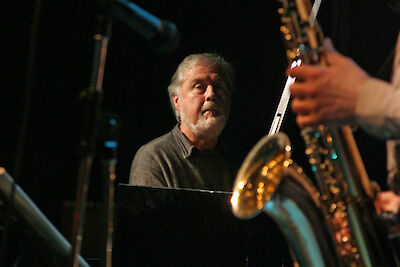
When the 'Leben in der Fabrik' association campaigned to save the Jagenberg site in Bilk and the city, with LEG as the developer, planned studios, exhibition spaces, flats and a community centre in the enamelled Art Nouveau buildings of the former mechanical engineering company, the original smithy turned out to be a place with charm and character. A stroke of luck for the ambitious goal of opening a lively forum for modern jazz in all its forms - including a bar.
Today, 30 years, around 2,500 concerts and 240,000 visitors later, the Schmiede remains one of the most renowned venues for contemporary jazz in Germany. Good reputation, best sound, exciting programme! And in addition to the state venue awards, the club has also earned the federal award, the Bundesspielstättenpreis, several times over the past decade.
Ralf Butscher, pianist and man of the first hour, was proud of the number 2 on his membership card, which he always carried in his wallet: "Düsseldorf had to get out of the jazz diaspora!", the 76-year-old recalled on the 20th anniversary of the spirit of optimism in the start-up phase: "I'll show you our future club," Peter Weiss told his friend Butscher and took him to the construction site at Himmelgeister Straße 107g. He stood speechless in the completely gutted smithy. "There was nothing to see! This image is still on my hard drive in my head." It was a risk, he thought, and the location was a bit out of the way. But he was infected by Peter's euphoria!
Thanks to Heiner Siefert, architect and all-round enthusiastic founding member, Weiss has the opportunity to utilise the experience gained from his performances. After all, the right height of a stage is a sensitive matter: if it is too low, the guests in the back rows can't see anything. If it is too high, the front row gets a stiff neck. Even worse: if the musicians are too high, it interferes with direct dialogue with the audience. Not only barrier-free communication with 199 potential guests is ideal in the Schmiede. A small flap becomes a coup! Weiss knew how important it was to have a permanently installed technical connection from the stage to the outside OB van for radio recordings. So it's no wonder that the WDR Big Band has long been a regular guest.
A brand needs a logo: Jean Lessenich types 'Jazz-Schmiede' in block letters - and a little Charlie Parker in profile blows his saxophone. A logo that becomes a household name. The centrepiece was still missing: the exquisite Steinway grand piano. The Heinersdorff company offers the association 50,000 Deutschmarks for a second-hand copy. But only half can be financed from the city's coffers. Members, sponsors and private individuals put in the effort to make up the 25,000 marks missing. at the time, Marianne Schirge, head of the cultural department, contributed 1000 marks from her private purse. A fundraising campaign finally mobilised friends of the jazz scene and offered a seat with a nameplate for 100 marks. "The wonderful Steinway B211 is still my favourite!" enthused jazz pianist Butscher. "The piano is tuned before every concert. I make sure of that!"
Full house at the opening concert of the new club on 29 September 1995. A beautiful, clear room - warm wooden floor, plain white walls, spacious and intimate at the same time - plus bar counter welcomes the curious guests.
The young musicians from the Clara Schumann Music School show off with a rich big band sound, Barbara Oxenfort takes off with 'Fly me to the moon', while Wolfgang Engstfeld (†) and Peter Weiss cultivate the free flight of ballad tones and rhythms. Congratulations and praise do the rounds, the free beer tastes good at the bar. Everyone seems happy, except for one person: Peter Weiss. He hears that "it rattles and bangs". He complains about the poor acoustics. The historic, pointed glass roof of the smithy is not just an acoustic problem. In summer, the room is too bright and, at up to 40 degrees, decidedly too hot! The grand piano, musicians and audience all suffer.
In order to at least somewhat reduce the harshness of the sound, the reverberation, the club members roll up their sleeves and install an insulating wall at the back of the stage. However, the club will have to wait until its 10th anniversary for a better climate thanks to internal blinds and external shading with heat screens for the glass roof. Mayor Dirk Elbers worked up quite a sweat when congratulating the club on its anniversary ... and Weiss never tired of pointing out the reasons for this.
The technical equipment also left a lot to be desired in the early days: "Back then, there was only minimal equipment, six microphones and a small desk." Lars Wallat knows what he's talking about. Even as a student at the Robert Schumann University, the Hesse native helped out at the club. Today, the engineer and managing director of the Schmiede is not only responsible for the good sound in the Schmiede. "No matter which musician comes, I can offer them what they need," says the 44-year-old - who is also responsible for the technical management - appreciating the high standard that has now been achieved: more than 20 microphones, several drum sets in addition to the Steinway, an electric piano, bass and guitar amplifiers, double bass and a first-class sound system and now even an original Hammond B3!
With the concert recordings by WDR, the Schmiede achieved national TV coverage in 2004/5. Television presence for a Düsseldorf cultural institute! This was previously the unique selling point of the Kom(m)ödchen.
But for a long time, the club could only dream of planning security. Initially 6000, then 10,000 marks, which had to be applied for each year, were available for the programme design in the first few years: The jam sessions, always on Tuesdays, offer a free playing field, an experimental space for the young scene from the region's universities. The sessions quickly become a crowd-puller and, as an 'insider tip' in the Marco Polo Düsseldorf guide, don't stay secret for long. Friday is reserved for concerts. Exchange, improvisation, inspiration, joy of playing - that is the special spirit of the Schmiede! The response grows in waves. Sometimes only 30 visitors listen intently, sometimes an auditorium of 150 jazz fans fills the room. The association's musicians raise money with charity performances. "In the early days, the programme booklet was as good as handwritten, but with heart and soul," emphasised Ralf Butscher.
"It wasn't allowed to cost much. But you could feel that something was developing!" Ali Claudi, another founding member and guitarist, had to juggle fluctuating figures as a cash auditor. "One problem back then was the hellishly high GEMA fees, which were calculated per square metre," he said, looking back on the 20th anniversary of Schmiede. He wrote letters of objection to the management. Tenor: "We are not a disco, we do culture! And we have to fight, we can't do that!" In the end, GEMA agreed to a 25 per cent reduction. A tax audit in the sixth year also caused turbulence. It was a good thing that a tax investigator was able to advise the members as an expert. nevertheless, an additional payment of 5,000 euros had to be absorbed. The careful management of the budget - by Lennart Nevrin and his successor Volker Strunk (†) - was undoubtedly not to be underestimated.
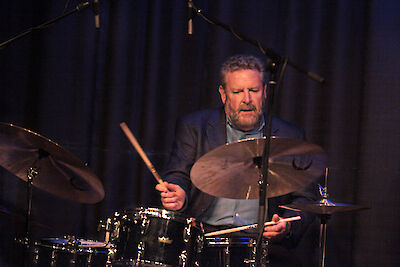
Because Peter Weiss was head of the Jazz Rally in Düsseldorf from 1995 to '99, Professor Wolfgang Engstfeld took over the chairmanship of the club and was later replaced by Ralf Butscher. However, Weiss remains the driving force behind the club, is a persistent grumbler at the Department of Culture when it comes to the Schmiede and, at the end of the 1990s, he exaggerates the situation - no fixed budget, no permanent position, only volunteers - in a letter to Hans-Heinrich Grosse-Brockhoff, head of the Department of Culture at the time: "Either we remain a provincial club with this small amount of funding, or we really professionalise the place!"

It will be another nine months before jazz gets its own budget position. Lars Wallat has been the only permanent employee since 2008. In a dual role as sound engineer and managing director. Det Lesny, who died in a tragic accident, had previously worked as a part-time employee for four years. The budget of 51,700 euros has been increased in recent years and currently stands at 113,000 euros (including Jazz im Hofgarten). Sustainable sponsorship was and is required. The Frankenheim brewery supported the club at the start, Sparda Bank has been financing the 'New Voices, New Faces' series for years, and finally board member Rainer Maassen took over a large part of the sum. Many other sponsors are listed in the appendix. The Schmiede allows visitors to participate in the donations with moderate admission prices.
Jörg Weule was not part of the founding clique. However, the mathematician and computer scientist soon became a fan of the sessions and concerts, has been a member of the association for 29 years and ensured an inviting online presence in the early years with his website maintenance. The newsletter he created continuously provides over 3100 recipients with information.
Board member Heinz Holzapfel (†) was initially responsible for the Schmiede programme flyer until 2011. Weiss brought the (co-)founder of the cultural brochure 'Biograph' onto the team in 1996. The two had originally spoken on the phone about an advertising club project in the free cultural programme newspaper. Two days later, Holzapfel was sitting at Weiss' kitchen table, immediately became a member, designed the flyers, took on PR work, organisation and box office, was managing director - and, as a cineaste and jazz newcomer, gave the Schmiede a series on film and jazz. Since 2011, many of these tasks - e.g. website maintenance and flyer design - have been taken over by Robert Weiss.
Wolfgang Frech (†) was irreplaceable as a veteran of the association. Whether amending the articles of association, registering the association, liaising with notaries, chairing the annual general meeting, working in the archives or acting as a point of contact for the current 370 members, the Swabian-born member kept the reins in his hands. And because the friend of swing and modern jazz, as he says about himself, was not one to mince his words, he also took over the moderation of the concerts on Fridays and Saturdays for years. His announcements almost had cult status.
Of course, the music is the nightly heroine. But a club also depends on a suitable host. Finding one took several attempts, mistakes and quarrels. Now the right person is behind the bar: Ivi Skoric has been running the Jazz-Schmiede bar as a restaurateur since 2007, but had already gained experience there five years earlier. "Everything here is live, the concert should not be disturbed as much as possible," is his maxim. He rearranges the seating according to reservations and plays quality music before the concerts that is not just background noise. He knows what the guests want and creates an overall feel-good atmosphere for all visitors.
The musical range at the Jazz-Schmiede is broad. Whether big band sound or bebop, fusion or blues ballads, swing or acid, funk, Latin, crossover ... musicians are the programme makers here: double bassist Reinhard Glöder selected the big bands, saxophonist Angelika Niescier the 'New Voices, New Faces', drummer Peter Baumgärtner - now chairman and artistic director - planned the Friday concerts for more than a decade; this series is now in the hands of bassist Nico Brandenburg. Performers have included the Cologne Saxophone Mafia, Charlie Mariano and world greats such as alto saxophonist Lee Konitz, sax legend James Moody, drummer Dave Weckl and colleague Billy Cobham, flugelhorn player Kenny Wheeler, trumpeter Uli Beckerhoff and Italian pianist Enrico Piranunzi.
Anecdotes on the fringes of the highlights: During a performance by US drummer Haynes at the end of the 90s, the spring of his foot machine suddenly snapped in the middle of his performance. A replacement machine is immediately handed over by the forge staff. The master is impressed by this professional service.
When television records the concert of Al Foster, long-time drummer with Miles Davis, the star seems slightly nervous. Peter Weiss hands him a whisky in the dressing room - and experiences a likeable, grounded guy.
The WDR Big Band - a permanent fixture in the club from the very beginning - gives its all during the live recording in 2010, when the recording manager in the OB van signals: "The computer has broken down. But the musicians don't know it yet ...!"
The Schmiede could only afford a pianist like the Frenchman Baptiste Trotignan because it supports its programme through its close cooperation with the Institut Français and the Polish and Italian Institutes in Düsseldorf. The club has also been a launch pad for careers - for Till Brönner and Roger Cicero, among others. Younger Düsseldorf jazz musicians include pianist Xaver Fischer, guitarist Philipp van Endert, bassist Nico Brandenburg, and pianists Sebastian Gahler, Philipp Wisser, Michael Knippschild and Philipp Schittek.
Alternating with the big band series for large ensembles, the 'New Faces' series has been providing a platform for up-and-coming talents from the universities - 374 so far - since 2007. Over the years, many of the up-and-coming artists who have performed at 'New Faces' have made their way and are now among the established greats of the German and international jazz scene. It is always a great pleasure to discover new talents and to wonder: which of them will establish themselves as a permanent fixture in the jazz landscape? At the same time, the audience has the chance to discover unheard-of avant-garde and the stars of tomorrow. One spectacular example is the Pablo Held Trio. The celebrated newcomers have earned their first merits at the Schmiede. "When Pablo Held says as a Cologne native," says Peter Baumgärtner, "the club is home coming for me, word gets around!"
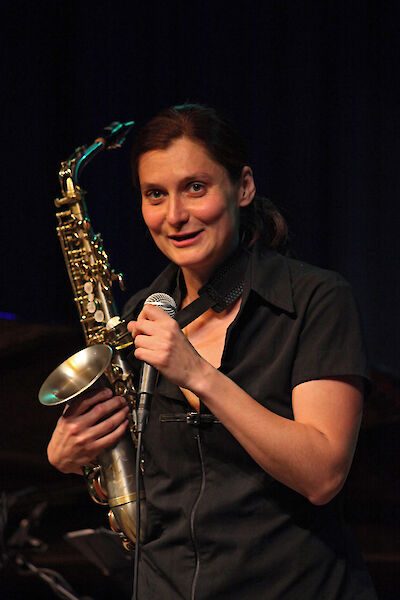
This is how the club makes a name for itself: "A musical home with style!" "A small concert hall with a bar and bar stools." "A meeting place with a relaxed atmosphere!" "You can feel how the musicians breathe." "Something special every evening!" "The audience doesn't shy away from complex structured music. And the musicians feel that they are supported by the audience."
And Uli Beckerhoff appreciates: "I can't remember exactly, but I think I played at the Jazz-Schmiede for the first time in 1996 and probably 20 more times since then. For me, this club is one of the best in Germany. Everything is just right for us musicians. The grand piano, the PA, the sound and the hotel. I've always felt really welcome here, and you have a great audience that is enthusiastic about jazz across all age groups.
Over the years, the entire Schmiede team has shown that it is possible to successfully run a jazz club in large German cities that does justice to the music, the musicians and the audience.
Many thanks for this and congratulations on the anniversary and here's to many more successful years!"
The importance of the club is also reflected in the regional and national perception: the 'Applaus' - the most important federal cultural prize for independent music venues and one of the most highly endowed federal cultural prizes - will be awarded to the Schmiede for its programme design every year from 2014 to 2018 and also in 2023 and 2024.
The 'NRW Venue Programme Award' - awarded by the LMR NRW - goes to the Schmiede every year with the exception of 2017.
2022 nomination for the German Jazz Award 2022 in the 'Venue of the Year' category. After the online voting of the German Jazz Union, the Schmiede comes in second place!
All that jazz ...! If you want to know exactly, you can read the list of all concerts in the event list.
As a calling card for jazz 'Made in Düsseldorf', the Schmiede produces its own CDs, each in editions of 500, almost all of which are sold out. And - as you would expect these days - the Schmiede now has its own YouTube channel with numerous concert recordings. There are currently more than 220 videos available to interested parties.
Not to forget: the open-air offshoot of 'Jazz in Düsseldorf'. The Hofgarten concerts, now almost 50 years old, 25 of which were organised by the association in cooperation with the 'One World Forum', have a loyal, weatherproof fan base. Four concerts a year with musicians from all over the world inspire thousands of people during the Schmiede's summer break. Jazz fans as well as families with children and passers-by enjoy the music on the lawn in front of the old music pavilion between the theatre and Jägerhof Castle under the motto 'Listen and lie down'. In cooperation with the 'Eine-Welt-Forum', the Schmiede ensures that jazz and world music is not only performed in the Schmiede or other venues, but that this music is brought outside to the people of Düsseldorf and visitors: 'Schmiede To Go', so to speak, 'open air' and free of charge! Joe Zawinul, Al Foster, Trilok Gurtu and Brian Auger performed here alongside many other musicians from all over the world!
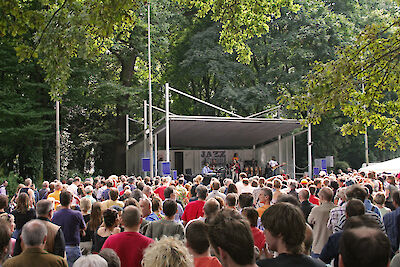
in 2015 - the year of its 20th anniversary - the Schmiede created a new event format: the target group of the series: the public of the city of Düsseldorf with an interest in culture and science. HHU, the 'Heinrich Heine University', in cooperation with the Jazz-Schmiede, opened itself up to a special, culturally dazzling phenomenon in an academic - quasi 'transdisciplinary' - encounter: jazz. Themed evenings were organised in loose succession in the university building, the HdU. A phenomenon in the field of music that 'crosses borders' or sometimes 'breaks boundaries' and is sometimes difficult to grasp, such as jazz, is an appealing subject for academics and for different academic perspectives, which were brought closer to a broader public in this way - in the sense of 'mutual illumination' (jazz in practice and academic approach in theory).
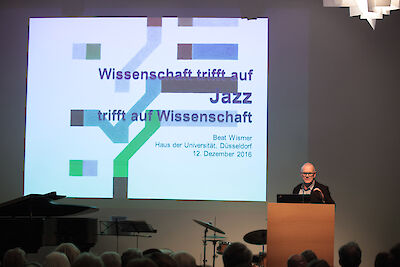
Embedded in two half-hour concerts, a short lecture - also lasting about half an hour - challenged the audience. The series was opened with a contribution by Professor Labisch (physician, historian and former rector of HHU) and - according to Professor Pretzler, who as host of the HdU fosters collaboration with the Jazz-Schmiede - developed into a particularly popular event. Subsequently, there were themed evenings with, for example, the experimental physicist Professor Desch (Bonn), the biologist Professor Baumann (Aachen), the philosopher Professor Feige (Stuttgart), the psychologist Professor Beauducel (Bonn), the art historian Beat Wismer ('Museum Kunstpalast' Düsseldorf) and several other representatives of different disciplines. The jazz ensembles were also of high calibre in each case: Sebastian Sternal (p), for example, was a guest several times, Ryan Carniaux (tp), Matthew Halpin (ts), Matthias Nadolny (ts), Oliver Lutz (b) and several others performed. Weiss himself was a permanent fixture on the drums on all theme evenings ..
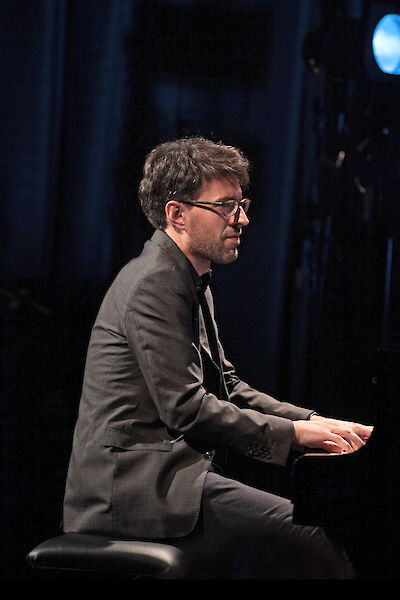
Of course, good vibrations also define the 30th anniversary, which will be celebrated from 26 to 28 September! Peter Baumgärtner has invited the Clara Schumann Big Band with saxophone star Jan Prax, as well as French jazz singer Claudine Bertault, and for the Schmiede open-air concert with house musicians and guests alike, "we can draw on the full potential!"
But the Schmiede is also involved in other areas. It acts as a host for cabaret and is now responsible for organising the 'Globalklang' concerts.
Under the motto 'Chamber Music Hall meets Jazz Club', the 'Spot On Jazz' festival of the current jazz scene took place in 2015, 2016, 2017 and 2022 in cooperation between the Schmiede and the 'Robert-Schumann-Saal' in the 'Kunstpalast' Düsseldorf. And for the past year and a half, the Latin sessions have also been making a name for themselves.
That leaves the question of the future. What will the club's next anniversary look like? Musically, it is undoubtedly vital. With a large number of young musicians at a high level, the next jazz generation has long been waiting in the wings. And for the fourth time, the Young Talent Jazz Award was presented, which gives up-and-coming musicians four concerts in NRW jazz clubs. Peter Baumgärtner has noticed an increasing number of young people in their 30s at the jam sessions on Tuesdays, and a full house anyway. With the first school co-operation, the Schmiede is reaching out to young people even earlier: The jazz club of the Ursulinen-Gymnasium high school presents itself in the club. In addition, the 'mother ship' Schmiede has encouraged the formation of satellites that carry jazz further into the city - with series in the Maxhaus, in the Johanneskirche and the Neanderkirche, in Haus Nielsen and in the Destille. After the 'Jazz City Bilk' festival premièred in 2024 to great acclaim, the number of venues has grown even further this year. For the first time, the multifaceted programme offered a dialogue between jazz music and contemporary dance with the world premiere of the choreography 'The Question of Time' by Neshama Nashman to the new composition 'Bilk Suite' by Wolfgang Schmidtke at the Rheinoper Ballet House.
But what prospects does the domicile on Himmelgeister Straße have? The state development company (LEG), from which the city rented the smithy, has been sold. The new owner is a private property company. "There is a contract for at least 30 years of use," assured the cultural office ten years ago, without whose long-term support the club would not have existed. It all looks like the 40th birthday can be celebrated again!
Play is back, Peter? Definitely, Peter! After all, continuity is guaranteed and has a name: from Peter to Peter - from Peter Weiss to Peter Baumgärtner, who have known each other for 52 years!
"The Jazz-Schmiede is a club by musicians for musicians. We know the needs better. We reflect the scene and give space to every style. However, at the beginning I didn't realise what I was getting myself into."
What brought the Schmiede to success, despite the bumpy road?
"Passion, energy, professionalism, a good team - and luck, of course. That's all it really takes!" Irony is obviously also part of it.
And what did Peter, the second, say: "30 years of Schmiede, I'm proud of that! We're a good team. And the atmosphere in the forge is great."
The wish for an air conditioning system remains!




